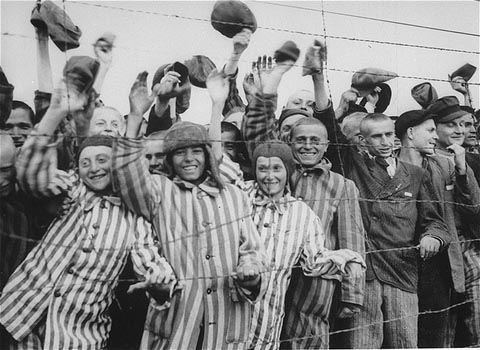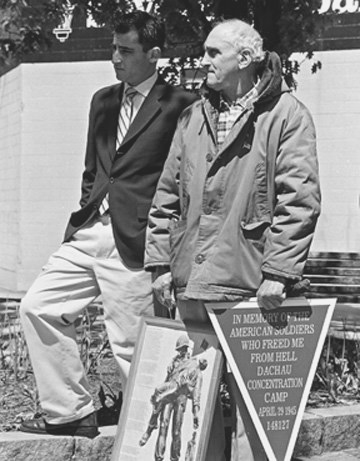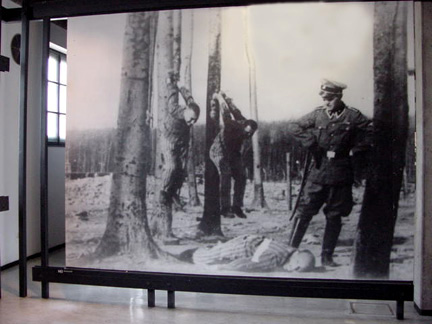Stories of Dachau SurvivorsStephen Ross The young boy at the far left in the photograph above is Stephen Ross, a 14-year-old Jewish orphan from Poland, who said that he had survived 10 different concentration camps in 5 years before he was liberated at Dachau. Standing next to him is Juda Kukieda, the son of Mordcha Mendel and Ruchla Sta. According to the book "Dachau 29 April 1945, the Rainbow Liberation Memoirs," edited by Sam Dann, Stephen Ross (real name Szmulek Rozental) was one of the lucky few who was rescued in the nick of time when Dachau was liberated. Ross was interviewed for the book and according to his own story, he was one of the 1,800 prisoners who were crowded into one quarantine barrack, which was designed to hold only about a hundred prisoners. Ross said that the prisoners in the quarantine barrack had not been fed for two weeks before the Seventh Army arrived. Food was scarce, and according to Ross, the prisoners were fed only occasionally when they were given "a biscuit, hard as a rock and covered with mold." From the quarantine block, Ross said that 80 to 100 prisoners a day were carried out and put on the pile of dead bodies near the barbed wire fence, from where they were taken to the crematory. According to Ross, the quarantine block was where the German SS Doctors Sigmund Rascher and Klaus Schilling selected prisoners for their ghastly experiments. The doctors "removed thirty to forty prisoners on a daily basis for experiments" according to Ross. Ross said that he "had been isolated in quarantine for experiments since 1944." On the day of liberation, Ross made his way to the main gate, although he "was very weak and hardly able to walk." With the help of his brother, who was also in the camp, Ross made it to the front of the crowd and was included in one of the most famous photographs of the liberation, shown at the top of this page. After the liberation of Dachau, Ross had to stay in the camp until the typhus epidemic was brought under control. When he was released, he made his way to Munich where he was hospitalized for 6 months and treated for tuberculosis. He was then sent to a Displaced Persons camp for orphans at a former forced labor camp in Landsberg am Lech, near Munich. Finally, he was brought to America where he was able to recover his health. Stephen Ross is the founder of The New England Holocaust Memorial in Boston. The photo below shows Stephen Ross with his son Mike Ross in June 2002.  The following information about Stephen Ross is from The New England Holocaust Memorial: The effort to build the New England Holocaust Memorial began with a Holocaust survivor, Stephen Ross (Szmulek Rozental), who was imprisoned at the age of 9 and whose parents, one brother and 5 sisters were murdered by the Nazi's. Between 1940 and 1945, he survived 10 different concentration camps. Like so many others Stephen Ross suffered terribly. His back was broken by a guard who caught him stealing a raw potato. Tuberculosis wracked his body. He once hid in an outhouse, submerged to his neck in human waste, to save himself from being shot. At one time he was hung [by his arms] for eating a raw potato. At age fourteen he was liberated from the infamous torture camp Dachau by American troops. Stephen will never forget the soldiers who found him, emaciated and nearly dead. They liberated him from a certain death. When Stephen and his older brother, Harry, the only other surviving family member, were released from the Dachau Camp to seek medical attention, they came upon a U.S. Tank Unit. One of the soldiers jumped off his tank, gave Stephen and Harry his rations to eat and put his arms around Stephen. Stephen fell to his knees, kissed the G.I.'s boots and began to cry for the first time in five years. The soldier took out of his pocket a piece of cloth and gave it to Stephen to wipe his tears. Stephen later found out that it was a small American Flag with 48 stars. This small flag is a treasured item and it will be kept by Stephen and his children as a symbol of freedom, life, compassion and love of the American soldiers. At the age of 16, Stephen was brought to America in 1948 under the auspices of the U.S. Committee for Orphaned Children. He was illiterate, having had minimal education prior to the Nazi occupation of Poland in 1939. Over the years, he managed to earn three college degrees. Steve made a new life in the Boston area and has worked for the City of Boston for over forty years. He provides guidance and clinical services to inner-city underprivileged youth and families. He eventually achieved the level of Senior Staff Psychologist. Soon after arriving into his adopted country, Stephen Ross had one dream, one vision and one mission. He wanted to remember, with a memorial, his lost family that was ripped away from him and murdered, the six million Jewish victims, other innocent people who lost their lives, those soldiers who liberated the concentration camps, and all the soldiers who helped end the war; he wanted the memorial to serve as a lesson to future generations. It was this one survivor with one voice who started the project to build a Holocaust Memorial. With the encouragement of a number of Jewish and Christian fellow employees of the City of Boston, a committee was formed to put together a proposal. Stephen then spoke with William Carmen, a WWII Veteran, about the memorial proposal and he immediately embraced the dream and became the Chairman of the Committee. Israel Arbeiter, President of the American Association of Jewish Holocaust survivors of Greater Boston also embraced the dream and became a member of the Committee. It truly turned out to be a Christian-Judaic Project for remembrance of human rights and the dignity of life. There were several City of Boston Officials, including Mayor Raymond Flynn, who were extremely interested in assisting Stephen with this vital task of erecting a Holocaust Memorial on the Freedom Trail. Soon after Thomas Menino became Mayor, he also came on board to join the forces of the committee. Stephen Ross said that he was hung by his arms at Dachau because he ate a raw potato. The hanging punishment was abolished at Dachau by Commandant Martin Weiss in 1942. Martin Sommer, the SS officer who originated this punishment, was dismissed from his job in the Buchenwald concentration camp and sent to the Eastern front after being put on trial, in SS judge Dr. Georg Konrad Morgen's court in December 1943, for abuse of the prisoners.  The photograph above, taken inside the old Dachau Museum in May 2001, shows a scene at Buchenwald that was created in 1958 for an East German DEFA film. (Source: H. Obenaus, "Das Foto vom Baumhängen: Ein Bild geht um die Welt," in Stiftung Topographie des Terrors Berlin (ed.), Gedenkstätten-Rundbrief no. 68, Berlin, October 1995, pp. 3-8) This fake photo is not included in the new Dachau Museum which opened in 2003.
Speaking in an event commemorating Kristallnacht, Steven Ross told an audience Thursday that it is essential to teach about the Holocaust. "Little kids must know, and if they don't know they won't tell their children and their children's children," Ross said. Kristallnacht (the Night of Broken Glass) the night of Nov. 9, 1938 when mobs in Germany and Austria ransacked Jewish homes, synagogues and stores. The next day, tens of thousands of Jews were sent to concentration camps. Ross came to the United States after the war and was then illiterate. He now works as a psychologist, and has worked to erect the New England Holocaust Memorial in Boston. He contributed to the memorial to American soldiers who liberated the Nazi concentration camps, which is being built inside the existing Holocaust memorial. It will open in April. "I cherish America, and I kiss the ground that I walk on," Ross said. "I never forget those men who saved me." [...] Speaking last, Ross periodically shed tears and made the audience cry as well. "I managed to survive by sheer coincidence," he said. He recounted his survival as well as the deaths of most of his family. He set up displays with the names of six extermination camps, hateful phrases that the Germans used to call Jews and photographs of Holocaust victims, one of which included him. His address was often graphic, as he described the manner in which he escaped mass killings and death by starvation. "To survive, we were resorting to cannibalism," Ross said. "We were eating each other to survive." Ross arrived in the United States stricken with tuberculosis at the age of 16. Along with his older brother, he had been sent to 10 Nazi labor and death camps over a span of five years. In his desperation to share as much as he could of what happened, Ross said that he "cannot tell everything; only a fraction of it." "I was in the wrong place, at the wrong time, (of) the wrong religion," he said. Ross recalled the death "selection," the experimental death methods of the Nazis and the extreme starvation, along with other abysmal aspects of life in the Nazi concentration camps. He showed the audience some objects from the camps: The cap he had to wear as part of his uniform; the dish he used to eat, bathe and defecate; prisoners' flimsy shoes; scissors men used to tidy themselves up before "selection"; and animal figurines made from the crushed bones of Jews. He said his mission is to "keep the images of the Holocaust alive" and "give people an inkling of what it means to be a survivor today." "You knew [you] were going to die, but you didn't want to die," Ross said. "The only thing that kept us alive was our religion." Back to Dachau LiberationBack to Dachau indexHomeThis page was last updated on July 1, 2012 |